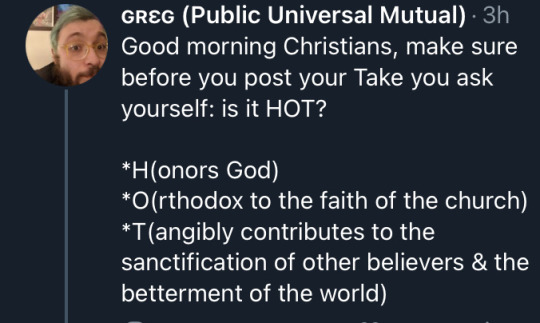Text
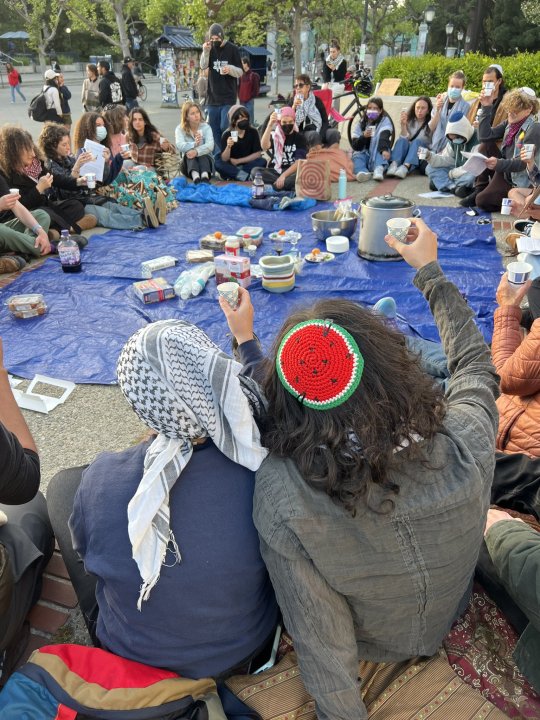
Passover seder at UC Berkeley’s Gaza solidarity encampment (via twitter)
4K notes
·
View notes
Text

texts my butch receives on a friday night
46 notes
·
View notes
Photo

Catherine of Siena, Prayer 10 (1379) (Noffke trans.)
643 notes
·
View notes
Note
can you please pray for a teacher of mine who has been very very important in my life? they've been out of school for a couple of weeks and haven't said why, only that they're going through something personal and would appreciate prayers. i care deeply about them and i've been so worried. if you could pray for them, or maybe if you know any prayers i could say, it would mean the world.
i know it's probably a bit silly to send this considering my first ask was only like an hour ago and you probably haven't even seen it yet, but this is the person who asked for prayers for my teacher. i've been praying all night, sobbing on my floor, probably looking like a crazy person reaching out above for some comfort from god. after sending that ask i just grabbed my bible and started reading out of sheer desperation to find something or anything that might comfort me, and somehow the first verse i saw was the beginning of psalm 77.
"I cried out to God for help; I cried out to God to hear me. When I was in distress, I sought the Lord; at night I stretched out untiring hands, and I would not be comforted."
You've both been in my prayers, beloved. It hurts to feel helpless, but the psalms have a unique way of putting our desperation into words. They show us that crying out is holy, and is itself a form of prayer, that will be listened to and preserved through generations. You're not crazy--you're human, the same kind of human that we've all been for thousands of years, and the author of this psalm is with you.
I hope you kept reading. The psalmist asks whether the Lord will reject them forever--and then there's a turning point in verse 10: "Then I thought: To this I will appeal:" and then they remember God's miracles, list God's works, and specifically recall the liberation of the Israelites through the Red Sea. The psalmist doesn't say whether the specific reason for their crying is remedied, but that's not what the psalm is about. It's about honoring miracles in the face of hopelessness, reminding yourself what kind of God you worship, turning your attention to the ways in which the world has been saved.
It can be hard to pray when we don't know specifics--but as someone who prays for people and situations that I rarely know the details of on a regular basis, it is a beautiful form of prayer, and God does listen. God holds more than we will ever know, and knows what we do not. Your love for your teacher brings you to God, and God's love for your teacher fills all the unknowing.
My favorite intercessory prayer at night is this one:
Watch, dear Lord, with those who wake or watch or weep, and give your angels charge over those who sleep. Tend the sick, rest the weary, bless the dying, soothe the suffering, pity the afflicted, shield the joyous, and all for your love's sake, Amen.
And here are a couple more from my prayer book:
Almighty and everlasting God, comfort of the sad and strength to those who suffer: Let the prayers of your children who are in any trouble rise to you. To everyone in distress grant mercy, grant relief, grant refreshment; through Jesus Christ our Lord. Amen.
O merciful Father, look with pity on the sorrows of [name], your servant, for whom we pray. Remember [them], O Lord, in mercy. Strengthen [them] in patience, comfort [them] with the memory of your goodness, let your presence shine on [them], and give [them] peace through Jesus Christ our Lord. Amen.
I pray for the things suffered that only those involved know about, the nights spent praying that feel like they will never dawn, the helplessness of knowing someone you love needs help, and the mercy of God present with us all. When all we can do is pray, we are doing everything by praying. I wish your heart the peace of God, and also honor the turmoil of caring for others. Both are held in our scriptures and our God.
<3 Johanna
16 notes
·
View notes
Text
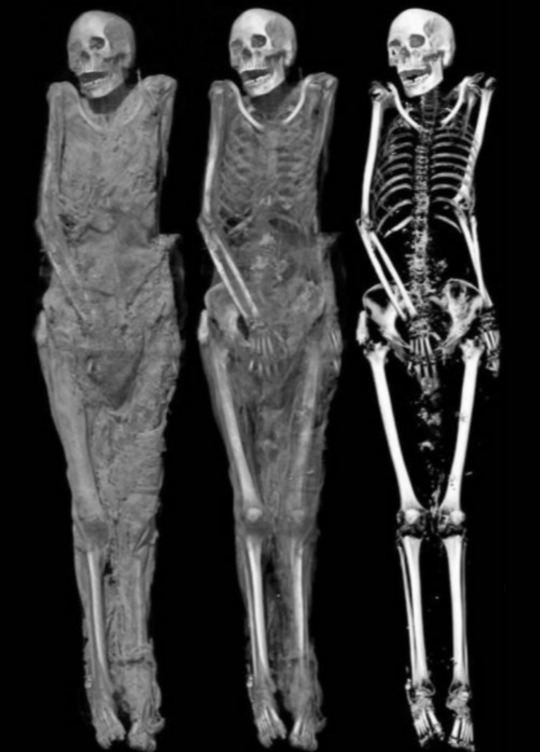

This Sudanese woman, now a 1300 year old mummy, has the monogram of St. Michael tattooed on her thigh.
909 notes
·
View notes
Note
hi ! i hope you're doing well, and i just wanna say first that i love your blog and it just radiates comforting vibes :)
i wanted to ask for some advice. i chose god over a year ago after having this push-pull thing with him for almost ten before that. most of my issues with actually accepting him came from ideas i had about him from his more conservative/evangelical followers, which i began to debunk for myself after figuring out that god, not them, was who i wanted.
so i've been sticking to the old testament, mostly. i found god in there, grew to love him because of it, and it's just a beautiful text, but also there are far fewer conservative dogwhistles in there than there are in the new testament. the new testament is hard for me to look at, and i feel guilty about it.
and its like- ive grown up with jesus my whole life. my parents are methodist, i was raised methodist. but i've never felt very close to him, thanks to those who twisted his verses about love and kindness into weapons against people like me. i read these verses that mean so much (john 3:16 and the like) and all i get out of it is a crawling sense of dread. like the associations are Bad, and it seeps through the whole new testament.
all this long-winded nonsense is basically to say that somebody got their hands all over the new testament and now i look at it and it is just barren. have you ever experienced something like this? any advice on how to,, reclaim the new testament or something? (thank you so much for reading this holy shit it's long. sorry about that)
Thank you beloved, I'm glad you're here! No such thing as too long here, I promise—well, there might be on my end. (You've been warned.) I'm overjoyed that you've chosen to pursue God—separating what you've been told from what you seek to believe in is such a hard thing to navigate.
I'm gonna be honest, this is such a refreshing question and I'm glad that you're asking it. I overwhelmingly hear the opposite from Christians—that the New Testament is easy and loving and comforting, and the Old Testament is scary and violent or whatever. I always want to ask first, what their opinions of Judaism are, because that's a red flag to me; and next, have they read the NT? It isn't easy and it isn't always comforting, and I think too many Christians only read the parts that they think are. The fact that you're recognizing those hard things and wanting to deal with them is a beautiful thing—we should take these texts seriously enough to criticize and struggle with them.
First of all: You have no need to feel guilty for what other people have done with holy things, or for your emotions. You have not done something wrong by carrying this hurt with you. What we feel is not in our control—but we can listen to it. Let this be a movement of desire, not of guilt. You're seeking God past the dread. You want to grow enough that the ideas people have taught you don't stand between you and what you want—and you've already done so much of this growth. I believe that you can keep moving in the direction of God, and find God in more and more places. But you don't have to pretend it's not hard. And if it was easy I'm not sure that would be a good thing.
Your experiences and associations and discomfort and fear—they're your history and they're also the history of the text. I'm sure you've heard people say "Don't let stuff like that turn you away from the original meaning of the verses!" Or "Jesus didn't mean that!" But of course the verses hold weight. They've had baggage before they ever got to you—two thousand years of it. Hold space for the fact that they've been used to hurt you and others. That's not meaningless—it's part of the meaning now. People who claimed their destruction was what Jesus meant have added to the history of Jesus and the text—and people who created love and beauty in honor of those verses have also added to these histories. We can learn about the original meaning of the text, but we cannot erase or ignore the meanings that have existed over the years. Go into this without guilt or pressure or expectation, and bring the anger and confusion and bad experiences. The text is strong enough to handle them. God is strong enough to handle them.
I want to acknowledge that finding God in the Hebrew Bible and existing there with Them is a beautiful thing. You don't have to equally relate to every single part of a religion to create a home there. Of course I hope that you grow new connections with the NT, but if it's never the same as the OT, that's not a flaw or a failure. None of us can find all the places where God is present and hold them all equally. Our brains aren't big enough for that. You have created a beautiful connection with God, and I hope that you know that there are so many fulfilled, faithful people who have not, and will never, experience God in the NT. Of course these people generally aren't Christian—and that's obviously a choice you can make—but I hope that knowledge reminds you that you aren't doing anything wrong. You have a duty to God, not to religion. And you certainly don't have a duty to the ideas you've grown up with or translators or interpreters or even to Biblical writers. We enter religion to learn and create community and to fully live out our duty to God—religion serves us, not the other way around.
I love that you brought up conservative dogwhistles because this is a point that, again, I've heard more people fall on the other side of! More people have a problem with the politics of the OT, for lots of reasons. The NT was written much closer to our current point in history, of course, in a time and culture much more familiar to most of us than Ancient Israel. The Roman Empire's language and government and philosophy has influenced the world immensely, and I think for most people it's therefore easier to exist in/relate to/project on. For you, though, this might be having the opposite effect. The fact that the Roman Empire is closer and more influential to our culture may make you more aware of its injustices and biases. Conservatism as we know it is much closer to values found in the Christian scriptures than the Jewish ones partially because it's more culturally and politically similar to ours. (Think about how many far-right people idolize the Roman Empire! And of course, think about how many conservatives are Christians.)
I'm assuming, because you're someone who notices politics in texts, that you've probably confronted things in the OT that you've had to process and put in context and perhaps still struggle with. I know that you've been met with violence and patriarchy, and that you've read verses that you probably know have been used to justify racism, sexism, slavery, and homophobia. Perhaps you've come to these chapters and said something like, "Wow, this has been used for a lot of evil, and this is something I have to deal with, but I also want to give grace to the culture that existed this way and told these stories, see the times that systems like patriarchy are challenged and changed over time, and use this for good and liberation in my own life." Maybe this is easy for you, or maybe it's taken a lot of strength.
Barbara Brown Taylor talks about "shadow languages" in her book Holy Envy (which I recommend)—languages in the Bible that assume things, that carry with them narratives we need to look out for. She identifies the language of contempt, the one of social hierarchy, the one that glorifies suffering for suffering's sake, the one that divides reality into opposed pairs. She tells us that "the purpose of staying on the lookout for languages like these is to prevent them from becoming uncontested parts of the Christian worldview. Every time I run into one of them hard enough to hurt, I turn around and look in the opposite direction, where there is almost always a counternarrative in scripture, just waiting for someone to notice it."
I think about how slavery is not abolished in the Bible—it has not been abolished ever. At various times in history, it has been taken for granted, challenged, uprooted, and changed form. Why are the ancient Israelites freed from captivity and go on to enslave people? Why does God move them to chip away at slavery but not fully eradicate it? Why does Paul say there is no slave or free under Christ Jesus, but preserves the social hierarchy inherent to that statement? It angers me that oppression is never abolished completely and immediately, but I also know that's not how people (or true stories) work. We take a lot of things for granted—and that leads many people to conservatism. I love Paul's writings, and I also know that his greatest sin (like many of us) was believing God's love liberated only as far as his imagination. He could imagine a God who loved the enslaved, could imagine a world in which their souls were equal, but could not imagine a world without slavery. He could imagine a spiritual equality of men and women, but not a social one. The gospel writers could worship a Jewish man as God, honor the scriptures he quoted, and add no nuance to the Jewish leaders who opposed him. They could imagine a messiah coming from Judaism but could not give grace to the Judaism around them.We all have failures of imagination, and we are always wrong. (Thanks be to God.)
I am not in the business of excusing harmful systems. I don't think you should do this when tackling the NT—I think you should challenge it and accuse it and dismantle it. But I also want you to remember the grace that you have brought to the Hebrew Bible. You have found God in a text with a lot of hard things and a lot of beautiful things—I bet you can do it again. Maybe it's more personal this time, maybe it's closer to your culture, but you have the skills. And maybe this is gonna make you go back to the OT with harsher eyes—so be it. Be curious about how this changes your relationship with history—humanity's and your own. However you understand conservatism, you can find it in both parts of the Christian Bible. And you can't take away the ways people have furthered that. But you can see them, and you can build relationships with the stories, knowing that your imagination can go further—and God's goes further still. You have been taught by bigoted people and a bigoted world, and you know it. You already know you want God, not them.
So what do we do when someone got their hands all over the New Testament? I love that question, because they absolutely have. They're still doing it. Someone got their hands all over the OT too—actually, probably more and worse someones seeing as it's a Jewish text and Christian hands are inherently meddling. But this is all part of the text's history. However much we believe God was involved, people wrote in their own language and from their own culture. The curation and copying and collecting and translating and analysis inherent to the Bible's existence (it didn't spring fully formed into the King James Version) are people's hands. We can't take that away—and in fact, we needed their hands for these texts to get to us.
Reclaiming the Bible for me has not included pretending those hands don't exist—especially when they're personal. What it has included is prying some of those hands off to see God underneath. The thing about that, though, is that it gets our fingerprints involved. You can't reach into a text and find God without getting your hands dirty. There is no pure holy text in this life. The NT that you're reading—unless you're smarter than me—is already translated. You can learn to read Greek, you can study history, but you're gonna be doing it with your own hands. While you're finding God in the text, accept that even if you go all the way back, the original writers' fingerprints are on the very first copy.
Let this move you to know that none of it is empty. I acknowledge the barrenness you're describing as the only thing you can see right now—but know that even if this is overwhelming, it's proof that the text itself is full. The fact that so many people, for good and evil, have touched it and transformed it, the fact that you desire connection with it, means that it is not empty. There would be nothing there for you to want to reclaim—but you're asking.
I think it would be really interesting for you to find the humanity in the gospels. Look for the people. Yes, these are characters told and retold—you can see the fingerprints—but they were people first. Look for people reclaiming and messing around and taking cultural things for granted and challenging other things—and live in it with them. Don't approach any of it as a solid text that exists—look at it as a living, breathing text that we all tear into. And, yes, this means people are going to twist it almost beyond recognition, but they do not have a monopoly on joining the story—you bring your experiences and your biases. Be human with it, the way that I'm sure you are with the OT, which is full of flawed, evil people who sing beautiful songs. Be human with them.
Enlarge your theological circle. Read liberation theology, queer theology, disability theology. Read the Quran, which is an amazing time that people got their hands on the NT (as well as having its own history of violence). Find different, beautiful hands that tell these stories in new ways. I can't promise you'll find beauty—that's such an emotional and personal experience. We can't force beauty out of anything. But other people have found and created beauty, and we can experience it secondhand—through stained glass, a musical, a movie, a song, a poem—not because their eyes are better than yours, but because they're also honest.
Barbara Brown Taylor (again in Holy Envy) recounts wisdom from a visiting imam, who "explained that the long lineage of Muslim scholars who have worked collaboratively for centuries to interpret the Quran in the most humane ways are more to be trusted than those who spill blood based on their own readings and ambitions." There are always other traditions, and when all we can see is a weapon, there are those who will unclench our fists.
I would encourage you to make sure you have a NT text that has footnotes to tell you when someone is quoting the Hebrew Bible. The NT is in relationship with, building on and interpreting and philosophizing about, the OT. If you are coming from the OT, bring those verses with you, the same way Jesus and early Christian writers did. The New Testament as a body of work did not exist for the first Christians—the scriptures they had were the ones you have connected with. You're in such good company. Look at how easily Jesus quotes scripture, the verses he adds on to and interacts with, the prophecies he sees himself in. Look at the sacrifice imagery that the gospel writers use to talk about Jesus—assuming that the reader will be familiar with these themes. Even within the OT, we can see later Jewish prophets criticizing and conversing with earlier verses—humanity is constantly in conversation with itself and God. You have such a good foundation for understanding this relationship.
The other good foundation you have? Wrestling with a text. It's the ones we're in community with that are the ones we're most often in conflict with and hold to the highest standards—for Jesus, this was the Jewish community he was a part of, and for you, this might be the NT. Have beef with your own scriptures and communities and religious leaders—reclaiming and wrestling are what the gospels are about. Acts and the letters in the NT are continuously debating the relevance of various OT verses. Do hard work on a text, and do it in good company.
Carry with you the scriptures you love as you travel into unfamiliar or painted-over territory. Know that you have something to come back to, however far you g0. While wading into waters you don't understand, you know that there's land under your feet—and you know that it's land that Jesus valued, that all the people in the NT valued, even as they wrestled with it. The first verses of the NT are a genealogy from Abraham to Jesus's adoptive father. Christians see this all as one story—whether you believe that right now or not, the human story is constantly moving, and God is your solid ground.
Jesus set down a foundation on that rock of God and Christians have added bricks to it and torn stuff down and messed around and burned it and kept building it—but you know there's God under it, because you've seen Them. So when you read Paul awkwardly shoving some bricks together and think, "That's not how I would build a community…" know that God's under there. When you read Peter denying Jesus, know that his name still means "rock," that you can still create solid ground after everything. You know where God is, and also, our lives are ever-expanding journeys of finding where else God could be. Yours looks different from the Christians who consider the NT to be that same rock, but that's okay! It's okay if the OT is a firm foundation for you, and the NT is one of the bricks. Look for God in those awkward bricks, which I know you can do because you've already done it. King David wrote the most beautiful songs I know—you don't ignore his murder and rape, you honor the whole story.
John 3:16 is a much-loved verse—but it being more important than other verses is a construct. You don't have to like it—in fact, the context of this is Jesus talking to Nicodemus, who doesn't understand what he's saying. Jesus is very familiar with confusion and even anger as a response—and he even seems to seek it out sometimes. Nicodemus comes to him as a genuine student, and Jesus starts going on about being born again, something that his new student seems to have no foundation for. Oh, to be a confused new student rather than someone whose had "being born again" held over my head! I wish I could come to the idea with no baggage! I wish I had no foundation for that idea, so I could start over—which would, perhaps, come closer to what Jesus is saying than any evangelical teaching.
Take care, keep trudging. Whatever path this brings you to, whatever communities you end up building, know that with God as the foundation, even awkward haphazard fingerprinted ripped-up texts can tell stories that we need to hear. I can't take away the associations you have with these texts, but I can pray you create new ones. Learn new songs, meet new characters. Get your hands messy.
Don't force a positive relationship—what people have done with the text is a barrier to you right now, and this might be more of a journey with a barrier than a going through it. There are pieces of barriers I've broken open that come with me when I revisit those verses. You already have a more honest relationship with all of this than so many others, and you have the skills already to know that it is God, not the world's followers, that you want.
I hope this wasn't long-winded nonsense, and I hope something here resonates. The short answer (which I probably should have put at the beginning) is that yes, I've experienced something like this. The year I couldn't read the Bible without panicking, I cried while watching The Prince of Egypt. In the years after that, I almost came back to it like I was converting—reading the basics, starting from scratch. Growing up and becoming purposely Christian (rather than your parents exactly) is a kind of conversion, and you have to reclaim the texts, and ask God to reclaim you as you are now.
Isaiah 55:10-11 tells us that God's word pours out like rain, and never returns empty. It sticks with us until something grows inside us. And John begins his gospel by telling us that the word became flesh and made his dwelling among us. This is a living word, one that cried and got angry and fell in love with his friends and participated in a culture and wrestled with God's will and interpreted scripture and was a person with us. You'll have to forgive Christianity for being so human—God did it first. God got his fingerprints all over us, and we wrote texts that have God's living breathing word—and also our messy hands. Thank God for your hands, and the love that they will bring.
<3 Johanna
#gonna be so real this was 11 pages on google docs and i got it down to 6. so if you think this is too long just know this.#asks
60 notes
·
View notes
Text

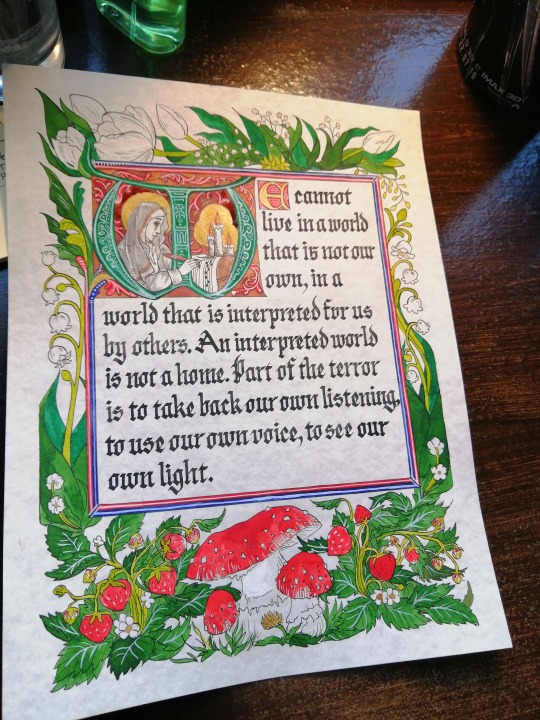
been a while since I posted one of my more complex pieces!
This lil guy is a Hildegard von Bingen quote, I was to include a variety of quite a few flowers!
For anyone curious, something of this detail level would go for around $120-150 CAD
911 notes
·
View notes
Note
god isn’t real but you seem pretty normal otherwise
please tell me exactly what is normal about me and i will rectify the problem immediately.
474 notes
·
View notes
Text

Suehiro Maruo’s depiction of Saint Sebastian
8K notes
·
View notes
Photo

“Repentance is the Awareness that Communion is Lost”
~Bishop Atanasije (Jevtić)
(Art: Return of the Prodigal Son, by Brent Kastler
113 notes
·
View notes
Text
Would you aid the Holy Family on their Flight into Egypt?
You can do so. Today.

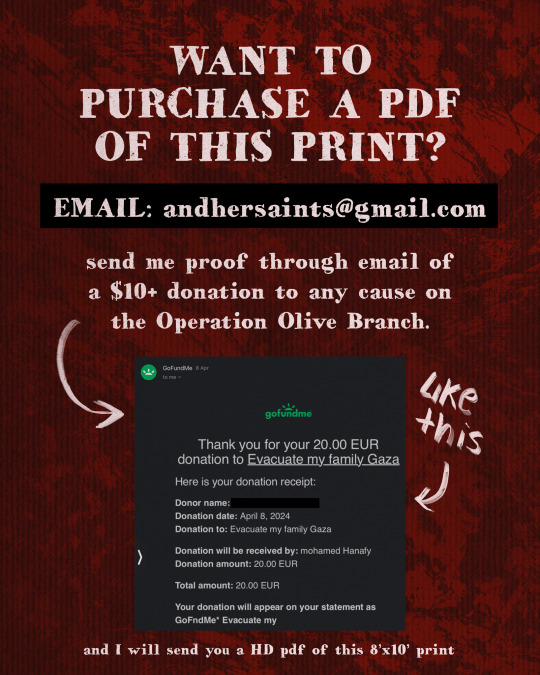
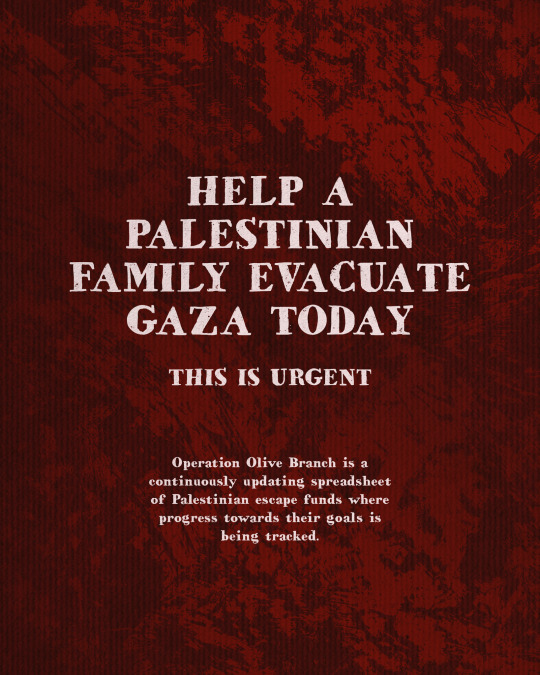
It is Catholic tradition to honor the Seven Sorrows of the Virgin Mary. These are seven moments in the life of Mary in which she felt immense pain, often symbolised by seven swords piercing her Immaculate Heart. The second one was the Flight into Egypt, detailed in the Gospel of Mark.
Today, thousands of Palestinians are attempting to make that flight. As Christians, we must see Jesus in them. We must see the Holy Family in each and every person pleading for their families' lives on GoFundMe. Thousands are trying to escape through the Rafah border, and the clock is ticking. Time is of the essence.
I've drawn this illustration, and whoever emails me proof ([email protected]) of any $10+ donation done to ANY evacuation crowdfund on the Operation Olive Branch spreadsheet, will get a high resolution pdf of it for free.
PLEASE! if you can't donate, share. Rafah is the only remaining exit out of Gaza, and talks about it shutting down next week are going around.
Kyrie Eleison.
363 notes
·
View notes
Text
“Allahumma innaka ‘afuwwun tuhibbul ‘afwa fa'fu ‘anni ”
— O Allah, You are Most Forgiving, and You love forgiveness; so forgive me
25K notes
·
View notes
Text
Eid Al Fitr Mubarak my dears عِيد مُبَارَك 🌹
May the jewels of Ramadan remain in the crown of our hearts. May our spiritual stature rise and worldly desires lay. May the beauty of Ramadan shine through us like a light to guide ourselves and others towards Jannah and may it never diminish as Ramadan leaves us. May our journey beyond Ramadan continue to be peaceful and beneficial; make the most of everything you have and with vigilance in everything you do as though Ramadan lasted a whole year round.
And always pray for those who may suffer this Eid, they need the strength more than us.
اَمِين يَا رَبَّ الْعَالَمِيْن
246 notes
·
View notes
Text
Although all the solemnities which are celebrated for God's honor in our churches are holy and venerable, most dearly beloved, nevertheless the day of the Lord's resurrection has a special festivity. And that because all other feasts are days of joy for the living only, but Easter's feast is one of happiness also for the dead. This solemnity is shared by those awaiting Him in hell as also by those still living, because rising from the dead, He wrought joy both there where He conquered death and there whither He returned as Victor.
St. John Chrysostom
everyone talks about the first christmas after someone dies—and for good reason, especially because it's so big culturally. but can we talk about the first holy week/easter? because this is so much more present and conplicated.
#this was last night's reading in Phyllis Trible's book of hours and I can't stop crying#even when days of easter are not happy for me#the dead are joyful#he can feel easter for me when i can't
187 notes
·
View notes



